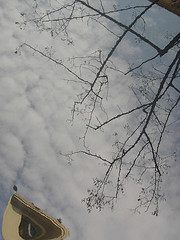Publicado en Semiótica. com. José Ángel García Landa

Yet more Atlantic narratologizing, courtesy of the Internet:
Dear Rui Dias,
I am attaching a file with my contribution to Theorizing Narrativity. Thank you for your interest in my work; it is a benefit to have good readers... above all if they are not too hard on one's limitations! Anyway, there are as many narrative theories as narratives (almost) and maybe you will find things both to agree and to disagree with here. By the way, if you intend to come back to narrative theory, are you subscribing to the University of Ohio Narrative-L e-mail distribution list? There are often stimulating discussions on narrative theory there, if you don't mind having a bit too much mail in your inbox occasionally.
All best wishes,
JoseAngel
www.garcialanda.net
PS: Maybe you already know, but in case you decide to go on there are more papers of mine available online, here:
http://www.unizar.es/departamentos/filologia_inglesa/garciala/publicaciones.html
Dear Prof. Garcia Landa,
Thank you very much for your most interesting paper, which I have just printed to read this weekend.
There is something, however, I would like to draw your attention to right now. On p. 2, you claim that «it is significant that Percy Lubbock proposes 'showing' and 'telling' (not 'saying' or 'speaking'). Well, I think that Genette will have remarked, somewhere in his «Nouveau discours du récit» (which you refer to in its English version), that Lubbock never explicitly used these terms, and I also have the strong feeling that I never came across them when reading «The Craft of Fiction» --- one of the masterpieces of New Criticism on a par with J. W. Beach's «The Twentieth Century Novel». Furthermore, in a footnote to his well-known article «Point of view in fiction: the development of a critical concept», Norman Friedman makes an attempt to trace back the origin of the 'showing--telling' distinction and the name he comes up with is certainly not Lubbock's. Be that is it may, I will have to check all this back home, since I have none of the material referred to above as I scribble this note.
If you wish me to make any further comments upon reading the paper, please just let me know. Thanks again for sending it to me.
Best wishes,
Rui
Dear Rui,
Yes, by all means, if you have any comments to make on the paper I'm all for it, I quite like to reconsider my views and see complementary perspectives on these issues. So you're quite welcome, with thanks!
As to the Lubbock concepts, the whole of his Craft of Fiction is devoted to a discusson of these contrasted ways of conveying a story, through direct statement or through inference and suggestion. The precise terms vary, and he uses a great number of alternative formulations (e.g. stating and dramatizing, etc.). But he does use, of course, the verbs "show" and "tell", or "showing" vs. "telling", among others, no matter what Genette may say!
E.g. on page 62 of the 1926 edition (Jonathan Cape, Traveller's Library) of The Craft of Fiction:
"I speak of his 'telling' the story, but of course he has no idea of doing that and no more; the art of fiction does not begin until the novelist thinks of his story as a matter to be shown, to be so exhibited that it will tell itself" (italics and inverted commas by Lubbock).
Anyway, I only referred to Lubbock as perhaps the most clear, definite and insistent propounder of these views—but of course much the same may be found in comments on technique by Henry James, or in Friedrich Spielhagen, even in Dickens! Stendhal too said much the same, opposing his showing the story to the reader to other novelists' telling it. Of course using French terms; but beyond the exact terms, which may vary, the basic notions are common enough before Lubbock. Of course, each theorist will add his own perceptions and connexions, to this issue which has been worrying narratologists' minds perhaps going back to Aristotle!


No hay comentarios:
Publicar un comentario
Se aceptan opiniones alternativas, e incluso coincidentes: